What is spin coating?
Spin coating is a solution-based process used for the fabrication of thin films, in the thickness range from micrometre to nanometre, to deposit uniform coating of organic materials on flat surfaces.
A substrate is mounted on a chuck that rotates the sample, creating centrifugal force which drives the liquid outwards. Then, the thin film is deposited by evaporation of the liquid. The machines carrying out this series of processes are spin coaters.
Request your Spin Coater Price Quote today!
Request your quoteSpin Coater Models
Discover the exceptional capabilities SPIN 150i and SPIN 200i, Spin Coaters. With unlimited programs, precise spin speed control (up to 12,000 rpm with ±0.1 rpm accuracy), and programmable rotational directions, these coaters provide unmatched versatility. Effortlessly coat substrates of various sizes, benefit from a user-friendly interface with three free programmable outputs, and experience seamless connectivity. See all the product details below.
Contact us now for more information or to request a quote for the SPIN 150i and/or SPIN 200i models.
Request your quoteSpin Coater SPIN 150i
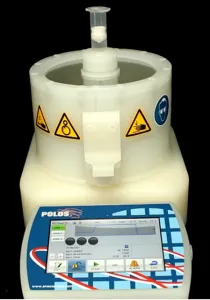
Spin Coater SPIN 200i
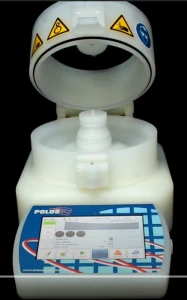
| SPECIFICATIONS | SPIN 150i | SPIN 200i |
|---|---|---|
| Available number of programs | Unlimited | |
| Steps per program | Unlimited | |
| Max. Spin Speed | (12.000 ± 1) rpm steps | |
| Spin Speed Accuracy | ± 0,1 rpm | |
| Spin Rotational Direction | Clockwise, counter clockwise and puddle | |
| Max. Acceleration | (30.000 ± 1) rpm/sec, programmable in 1 rpm/sec | |
| Spin Time | From xx h to 0,1 sec | |
| Free Programmable Outputs | 3 pcs, relays, nominal switching capacity. 0.5A/125VAC – 0.3A/60VAC | |
| SYSTEM DATA | ||
| Housing material | Natural polypropylene (NPP) | |
| Process chamber material | Natural polypropylene (NPP) or high chemical resistant PFTE | |
| Interface | Detachable, full-size touchscreen, glove-friendly, IP52, chemical resistant | |
| External connection | 1 USB port in the controller | |
| Max. Substrate Diameter | 160 mm round or 4’’ x 4’’ square | 260 mm round or 6’’ x 6’’ square |
| Max. Process Chamber Diameter | 202 mm | 302 mm |
| Dimension (Desktop Version) | 274(w) x 250(h) x 451(d) mm | 380(w) x 307(h) x 559(d) mm |
| Shipping Weight | 14 kg | 20 kg |
| Shipping Dimensions | 600 x 380 x 360 mm | 680 x 580 x 480 mm |
| REQUIREMENTS | ||
| Voltage | 100-200 VAC/200-240 VAC 50/60 Hz(autoselect) | |
| Power Consumption | Max 500W | |
| Max. Current | 5A / 2,5 A | |
| Vacuum | -65 kPa (-19 in Hg), ≥ 80 LPM Tube OD ᴓ 8 mm | |
| Motor Purge Gas | 20-50 kPa, 2-5 L/min, Tube OD ᴓ 6 mm | |
| Drain Connector | 1’’M-NPT | |
Spin Coater – POLOS Series
The POLOS Series offers different models with a wide range of options including simple handling programming on the touchscreen controller, only if used outside of glovebox, port USB connection to upload and download from any PC and access to unlimited programs and graphic representations among others. View more details about the POLOS Series below.
Contact us now for more information about the POLOS Series.
Request your quoteSpin Coater POLOS 200 ADVANCED
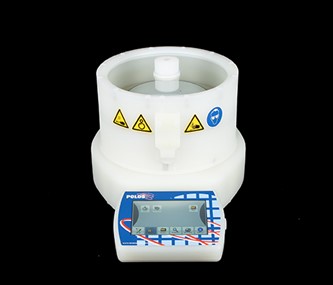
Spin Coater POLOS 300 ADVANCED
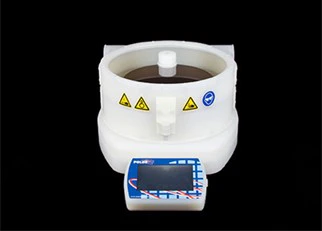
| SPECIFICATIONS | POLOS 200 Advanced | POLOS 300 Advanced |
|---|---|---|
| Available number of programs | Unlimited | |
| Steps per program | Unlimited | |
| Spin Speed | (0-12.000 ± 1) rpm | |
| Spin Speed Accuracy | ± 0,1 rpm | |
| Spin Rotational Direction | Clockwise, counter clockwise and puddle | |
| Max. Acceleration | (30.000 ± 1) rpm/sec | |
| Free Programmable Outputs | 3 dry relays, nominal switching capacity. 0.5A/125VAC – 0.3A/60VAC Up to 16 digital input, 16 digital output, 4 analog input 4 analog output (optional IO modules) |
|
| SYSTEM DATA | ||
| Housing material | Natural polypropylene (NPP) | |
| Process chamber material | Natural polypropylene (NPP) or high chemical resistant PFTE | |
| Interface | Detachable, full-size touchscreen, glove-friendly, IP52, chemical resistant | |
| External connection | 1 USB port in the controller | |
| Max. Substrate Diameter | 260 mm round or 6’’ x 6’’ square | 360 mm round or 8’’ x 8’’ square |
| Max. Process Chamber Diameter | 302 mm | 402 mm |
| Dimension (Desktop Version) | 380(w) x 307(h) x 599(d) mm | 430(w) x 310(h) x 650(d) mm |
| Shipping Weight | 20 kg | 32 kg |
| Shipping Dimensions | 680 x 580 x 480 mm | 780 x 620 x 580 mm |
| REQUIREMENTS | ||
| Voltage | 100 - 200 VAC/200 - 240 VAC 50/60 Hz (autoselect) | |
| Power Consumption | Peak 1800 W | |
| Max. Current | 10A / 8A | |
| Vacuum | -80 kPa (-24 inchHg), ≥ 80 lpm Tube OD Ø8mm | |
| Motor Purge Gas | 20 - 50 kPa, 2-5 l/min, Tube OD Ø 6mm | |
| Drain Connector | 1’’M-NPT | |
Spin Coater Natural Polypropylene
POLOS Series uses High Grade Natural Polypropylene (NPP-H), with α-crystalline properties as housing material for the spin coaters and chucks. This material offers more rigidness and toughness than other derived materials as well as an increased life-span and higher chemical and stress-crack resistance, improving from normal polypropylene.
This material also offers benefits to the system operations, with an acceleration of 0-12.000 rpm in 3 seconds, an accuracy of 0.1 rpm, and a substrate size which can vary from 5 nm to 450 nm.
Not only does NPP-H offer the wide variety of benefits already listed but it can be used in the vast majority of applications and is a much more economical option than other possibilities as PTFE. Moreover, the chemical compatibility of High Grade NPP is graded mostly with an excellent rate with the materials used for coating, the same that PFTE.
For those exceptional applications that require PTFE, TFMTM 1600 is used, which offers a better chemical absorption rate than standard PTFE.
POLOS 450 ADVANCED
The POLOS 450 ADVANCED is a highly capable and versatile solution for thin film deposition. With unlimited programs, precise spin speed control, and support for various substrate sizes, it ensures uniform coatings. The user-friendly interface, sturdy construction, and multiple output options make it a reliable choice. Discover the power of the POLOS 450 ADVANCED Spin Coater for your thin film deposition needs. Explore the POLOS 450 Advanced in more detail below.
Contact us now for a price quote or to get more information about the POLOS 450 Advanced,
Request your quoteSpin Coater POLOS 450 ADVANCED
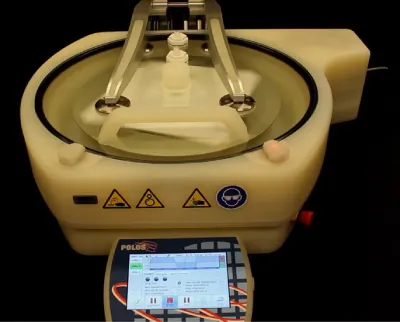
| SPECIFICATIONS | POLOS 450 ADVANCED |
|---|---|
| Available number of programs | Unlimited |
| Steps per program | Unlimited |
| Max. Spin Speed | (1,500 ± 1) rpm |
| Spin Speed Accuracy | ± 0,1 rpm |
| Spin Rotational Direction | Clockwise, counter clockwise and puddle |
| Max. Acceleration | ≤1,500 rpm/sec, depending on the load |
| Free Programmable Outputs | 3 dry relays, nominal switching capacity. 0.5A/125VAC – 0.3A/60VAC Up to 16 digital input, 16 digital output, 4 analog input 4 analog output (optional IO modules) |
| SYSTEM DATA | |
| Housing material | Natural polypropylene (NPP) |
| Process chamber material | Natural polypropylene (NPP) or high chemical resistant PFTE |
| Interface | Detachable, full-size touchscreen, glove-friendly, IP52, chemical resistant |
| External connection | 1 USB port in the controller |
| Max. Substrate Diameter | 460 mm round and 350 x 350 mm square substrates |
| Max. Process Chamber Diameter | 502 mm |
| Dimension (Desktop Version) | 795 (w) x 638 (h) x 922 (d) mm |
| Shipping Weight | 75 kg |
| Shipping Dimensions | 800 (w) x 790 (h) x 1180 (d) mm |
| REQUIREMENTS | |
| Voltage | 200-240 VAC 50/60 Hz |
| Power Consumption | Peak 1000W |
| Max. Current | 10A |
| Vacuum | -80 kPa (-24 in Hg), ≥ 80 LPM, Tube OD ᴓ 8 mm |
| Motor Purge Gas | 20-50 kPa, Tube OD ᴓ 6 mm 500 LPH |
| Drain Connector | 1,5’’M-NPT |
Request your quote or more information about Spin Coater using the form below!
Our team will be happy to assist you.
What are main factors influencing the uniformity of thin films after spin coating?
The main factors influencing the uniformity of thin films after spin coating are:
– Viscosity: Corresponds to the thickness of the thin film.
– Rotation speed: Adjustable and affects the coating outcome.
– Process temperature: Impacts the thin film properties during deposition.
– Time: Influences the duration of the spin coating process.
– The void (on/off): May affect the presence of gaps in the final coating.
Which method is preferred for preparing coatings of nanomaterials?
To determine which method is better for preparing coatings of nanomaterials, several factors need to be considered, such as the specific nanomaterial properties, desired coating thickness, substrate type, and the intended application of the coated material.
Each method has its advantages and limitations, and the most suitable method will depend on the specific requirements and objectives of the coating process.
Three methods are:
Electrophoretic deposition method
Spin Coating
Spray coating
